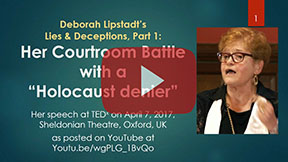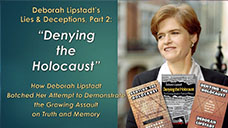In early 1996, the revisionist Web site www.zundelsite.org caused a storm in the then still relatively tiny internet-pot, since its content was hated by several Jewish lobby groups and in particular by the German authorities, who all together tried with several legal and less than legal techniques to shut down this controversial site. These attempts on censorship resulted in a massive movement of solidarity in the then still quite idealistic internet community. At the end of many months of struggle, all measures to stifle the zundelsite had failed, also because many idealists around the world posted copies of the zundelsite, not because they agreed with the content of the zundelsite, but because they wanted to defend the highly regarded freedom of speech against all attempts of censorship.[0]
Of course, governmental as well as non-governmental institutions kept trying to find more effective ways to censor the internet. The censorship case with perhaps the most damaging impact on Internet freedom of speech in Germany was probably that against Dr. Fredrick Töben, who was arrested in early 1999 in Germany and subsequently sentenced to a prison term for having posted revisionist contents on his Australian website.[1] The case was so important that it even became the object of a PhD thesis.[1a] Since 1999, anyone can be prosecuted in Germany for Internet content, as soon as it can be downloaded in Germany. hence Germany has expanded the application of her penal law to the entire globe.
In October 2002, an academic paper about censorship of internet search engines has caused quite a stir on an international level, but has unfortunately not led to a similar reaction by the internet free speech community as it did in 1996.
Background
End of 1996, U.N. Secretary General Boutros Bourtros-Ghali demanded that action should be taken on an international level to censor xenophobic and racist material on the Internet. In a U.N. report on human rights, Maurice Glele-Ahanhanzo also mentioned alarming, renewed tendencies to deny the "Nazi-Holocaust", referring explicitly to the website of German historical dissident Ernst Zündel (www.zundelsite.org; Inter Press Service, Nov. 21, 1996). Since early 1996, Zündel’s website, had been the battleground of massive attempts to censor it with both legal and illegal measures, as the site itself documents. Also in 1996, the European Union agreed to introduce a system of voluntary internet censorship, which enables internet users to report websites with illegal material to the authorities, which in turn would take legal actions against Internet service provides to force them to delete the content of such sites or to prevent access to them. [Index on Censorship, 6/96]
On March 20, 1997, the Austrian authorities confiscated all computers of the Internet Provider VIP located in Vienna, because it hosted a website with child pornography. In protest to this censorship all Internet service providers of Austria shut down all their services for two hours on March 25, 1997, but to no avail. [http://www.vov.de/von-uns/presse/mitteilung.phtml?id=40]. Also in early 1997, the head of CompuServe Germany, Felix Somm, was indicted for distributing pornographic as well as dissenting historical and political material deemed illegal in Germany. First sentenced to a two years suspended prison term, Somm was acquitted in late 1999 during his appeal only because the court stated that there is currently no technology available allowing the filtering of internet content [Associated Press, November 17, 1999, http://www.cyber-rights.org/isps/somm-dec.htm]. That decision meant, however, that Internet service providers will be held responsible for content hosted on computers located in Germany. It also meant that the intentional spreading of illegal content can and will be prosecuted and punished, which means that placing links to illegal content can suffice to cause a criminal investigation. [http://www.heise.de/newsticker/meldung/51930: fined for placing links to political right-wingers]
This restriction to their own territory did not stop the German authorities, who keep threatening Internet service providers to filter out websites that have a content deemed illegal in Germany. In 1999, the German Supreme Court decided that even foreign citizens not residing in Germany who put content on the Internet deemed illegal in Germany will be prosecuted and sentenced, should they dare to step onto German soil. [German Federal Supreme Court, ref. 1 StR 184/00, Dec. 12, 2000; re. F. Toben, see note [1]] Even though there may not be a bullet-proof way to block access to internet sites that cannot be shut down by the German authorities because they are locate abroad, it is of course possible to demand from providers not to forward the content stemming from certain domains to their customers. That is exactly what the German authorities started doing in late 2002: They sent out letters to German Internet service providers demanding to block access to certain domain names for their customers. The victims of such censorship are no longer pornographic site, but exclusively political and historical dissidents. [http://www.heise.de/newsticker/meldung/24721] And it did therefore come as no surprise that more and more people from Germany, Austria, and Switzerland inform the author of this article that they can no longer reach websites with dissident historical material like www.vho.org.
In September 1997, I established the website www.vho.org, initially under the legal cover of the Belgian non-profit foundation Vrij Historisch Onderzoek (Free Historical Research), thus the name vho.org. After a few years, www.vho.org had grown to be the biggest revisionist website worldwide. In 1998 I learned that Germany has its own search engines concentrating only on German language material. Since at that time the content of www.vho.org was almost completely in German language, it was only logical to have the site registered with those search engines as well. To my surprise, one of the search engine companies told me that they had decided not to list my site, because after reviewing my content they had come to the conclusion that it was illegal under German law. This is so because dissenting views on the Holocaust are punishable with up to five years in Germany. Strictly formally seen, of course, this is wrong, since it is not the content of my website that is illegal but the German censorship laws. But the German bureaucrats were never really impressed by arguments about human rights and epistemological considerations. Thus, I had to accept that www.vho.org was not listed with this search engine.[2]
On an international level, Yahoo.com was the first big search engine who got in trouble primarily due to massive critique from Jewish lobby groups. Yahoo is one of the biggest internet service providers worldwide, whose search engine is currently powered by a company named Google. Google itself is a search engine which has succeeded only recently to beat all its competitors in that field, like Altavista.com, Lycos.com, and Excite.com, thanks to a very user friendly service. End of October 2002, this service had 2.5 Billion websites indexed.
In 2000, the attacks against Yahoo escalated in that the company was sued, and on November 20, 2000, sentenced in France for having offered National Socialist memorabilia on its internet auction site and for offering access to sites with Holocaust-revisionist content.[3] Since then, Yahoo has cleaned its French search engine from almost all links to such sites. Later, due to pressure from the usual Jewish pressure groups like the Simon-Wiesenthal-Center, Yahoo announced that it would be prepared to even clean its U.S. main search engine from links to any content which is hated by those Jewish associations.[4] It seems, however, that this did not happen so far. Instead it was decided to redirect visitors with French or German IP addresses to the respective censored Yahoo search engine of these countries without giving them an option, hence denying them access to the U.S. search engines.
As a result of Yahoo’s conviction in France, the Central Council of Jews in Germany felt encouraged to announce that it will file similar suit cases against German search engine companies as well.[5] It does therefore come as no surprise that German search engines or the German sections of internationally operating search engines started to clean undesired content from their engines as well.
Scientific Analysis
On October 22, 2002, Jonathan Zittrain and Benjamin Edelman from the Berkman Center for Internet & Society at the Harvard Law School published a study, in which they reported which internet sites are censored by the German and French sections of the search engine Google, in contrast to the company’s international, US-based main search site Google.com.[6]
The result of this study is that the French and German search engines of Google exclude 91 internet sites completely or partly.[7] Even though such an exclusion doesn’t prevent anybody from accessing these sites, this must nevertheless be considered to be a massive impediment to find these sites, because a considerable part of the population residing in Germany and France finds content on the internet by using these search engines. The exclusion of search results from websites which are involved in controversial debates leads to nothing less than that a majority of the population will no longer be able to take notice of the arguments of the other side of that debate.
Of course, censorship by search engines is not solely an effect of governmental pressure. Even private companies and individuals can pursue such censorship and might even prevail. For example, The Church of Scientology allegedly succeeded to convince Google not to list certain websites, which express critical views about Scientology.[8] In other cases, organizations or individuals have the option to apply to have certain websites unlisted, if these sites commit copyright violations.[9] Only a few of these censorship cases are ever published; most of them happen in secrecy. No search engine likes to admit publicly that they manipulated their search results. According to Edelman, Google should at least indicate that its search results are not complete:[10]
"If Google is prohibited from linking to [the right-wing Website] Stormfront, they could include a listing but no link. And if they can’t even include a listing for Stormfront, they could at least report the fact that they’ve hidden results from the user. The core idea here is that there’s no need to be secretive."
Censorship Victims
According to the authors of the study quoted, they have analyzed several thousand websites until the end of October in order to find out, if the search results delivered by the three Google sections google.com (USA), google.de (Germany) and google.fr (France) differ. The censorship victims discovered by this method are divided in basically three categories. The largest group consists of right-wing websites, which are usually summarized under the term "White Supremacy." The second biggest group consists of revisionist websites-with one surprising exception: The most embattled website, carrying the name and the mission of the German-Canadian Ernst Zündel, www.zundelsite.org, is not included! The last category consists of radical, anti-Jewish, mostly Arab groups. In the list printed in this article, I have emphasized revisionist websites in bold face, and those consisting only partly of revisionist content in italics.
A more detailed analysis of the censored websites shows that some Christian and conservative-fundamentalist websites are victims of this censorship as well, and in one case even an anti-revisionist website (www.williscarto.com). Left-wing extremist, communist, or other politically or religiously fanatic/fundamentalist sites have either not even been considered worth an investigation by the authors, or they are simply not censored by Google.
It is also worth noting that all of the German sites censored by Google are equally censored by its French site (65), whereas 45 websites, which are accessible through the German search engine, are inaccessible through the French search engine. This means that censorship is currently tougher in France than it is in Germany.
More Censorship…
Google does not only serve as the search engine for Yahoo, but also for AOL, the worldwide largest internet service provider. As a consequence, all German and French AOL-customers not intentionally using a different search engine, are censored just as badly as are all users of google.de/.fr and yahoo.de/.fr. Three major other search engines with separate German and French sections-altavista, lycos and excite, censor their search result as well, though apparently not quite as strict as google. For instance, webpages from the once leading revisionist websites codoh.com and codoh.org can be found when searching with these engines. All of these search engines have in common, however, that the worldwide largest revisionist website www.vho.org is not listed under any circumstances.
Before getting upset about Google, Altavista, and all other censoring search engines, one should keep in mind that these companies do not censor voluntarily. They were forced to do this by court orders and several legal threats. The true perpetrators are sitting in Paris and Berlin and to a disproportionate degree also in synagogues.
… And Attempts to Circumvent it
One can of course try to use non-censoring search engines instead. For example, one could visit the uncensored.com search domains instead of going to the.de and.fr domains (aol.com, yahoo.com, google.com, altavista.com. excite.com, lycos.com). But Google has put a stop to this as well for all visitors, whose internet service providers have an IP address which can be identified as being located in Germany or France respectively. In such cases, Google redirects any attempt to access google.com automatically to google.de/.fr. Thus, all internet users in Germany and France are now sitting in the dark regarding the possibility of thoroughly searching the internet with the help of the largest and best search engine that there is: google.com.
It would be desirable if all users who are upset about such totalitarian censorship would demonstrate their solidarity by no longer using the search domains.de and.fr of these search engines, and in particular by not using those search engines which refuse access to its uncensored international domain, like Google. After all, this is not a matter of whether or not one agrees with the content of those sites which are censored. Tomorrow, when other powers rule or their interests change, other websites may be the victims of this censorship, and a totally different group of users might then face the situation that exactly the content he is looking for is being withheld from him, or even worse, that the content he is offering is being withheld from his potential clientele.
Dark Future
During a session of the European Council in Strasbourg on November 6th and 7th, 2002, the foreign ministers of 44 European countries represented in the European Council agreed to a protocol, which demands from those 44 nations to outlaw the following activities:[11]
- Computer assisted distribution of racist and xenophobic material;
- Threats and insults with racist or xenophobic motivations;
- Denial, rude minimization, approval, or justification of genocide or crimes against humanity, in particular in context with the events of the era between 1940 and 1945 (in other words: revisionism).
All offenses mentioned in this protocol need to be committed deliberately in order to be a crime, which means that an internet service provider would not commit a crime if helping to distribute such material unknowingly, but would have to cease assisting the crime if made aware of it. During the negotiations for this protocol, representatives of the USA, of Canada, Japan, Mexico and South Africa were present as well.
Fortunately, the European Council has no legislative powers. But it may only be a matter of time until this program is accepted and cast into law in many countries around the world.
Only as an aside, it should be mentioned that the prohibition of the distribution of pedophilic material was apparently not even discussed during this Conference.
Notes
| [0] | Back then under www.webcom.com/ezundel/; see the paper by Ingrid Rimland, „Revisionismus im Cyberspace“, Vierteljahreshefte für freie Geschichtsforschung, 1(2) (1997), pp. 91-99. |
| [1] | Cf. Willibald Gründer, "Der Prozeß gegen Dr. Fredrick Toben" (The trial against Dr. Fredirck Toben), Vierteljahreshefte für freie Geschichtsforschung, 1(2) (1997), S. 91-99. |
| [1a] | Florian Körber, Rechtsradikale Propaganda im Internet – der Fall Töben, Dissertation, Logos Verlag, Berlin 2003. |
| [2] | I do not mention any name here because now www.vho.org is listed. |
| [3] | http://news.excite.com/news/r/000616/08/france-usa-yahoo; www.oneworld.org/ips2/june00/00_41_003.html; www.guardian.co.uk/freespeech/article/0,2763,400491,00.html; www.tomwbell.com/NetLaw/Ch03/YahooComplaint.html |
| [4] | New York Times, Jan. 3, 2001. |
| [5] | German weekly news magazine Spiegel, Feb. 20, 2001. |
| [6] | http://cyber.law.harvard.edu/filtering/google/; cf. AP news release of Oct. 24, 2002; www.sltrib.com/10252002/business/10409.htm |
| [7] | http://cyber.law.harvard.edu/filtering/google/results1.html; the authors mention 113 sites, but they have listed some sites several times, in one case with and in the other without www, in other cases they have counted subdomains as well, and some sites no longer exist, like, e.g., www.spotlight.com, www.revisionism.com. |
| [8] | www.wired.com/news/politics/0,1283,51233,00.html |
| [9] | Cf. http://www.archive.org/about/terms.php |
| [10] | http://zdnet.com.com/2100-1105-963132.html |
| [11] | http://press.coe.int/cp/2003/048a(2003).htm |
Source: G. Rudolf, “Censorship of the Internet,” The Revisionist 1(2) (2003), pp. 220-222. Updated and expanded version.






